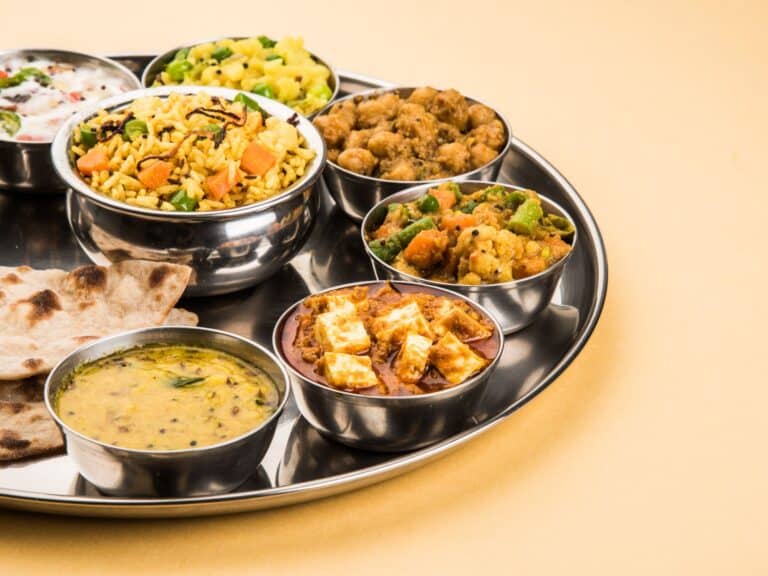Recipes That Inspire and Delight
Discover a world of vibrant flavors and nourishing meals. From timeless Indian classics to creative fusion dishes, our recipes celebrate the joy of cooking with love and care. Whether you’re a seasoned chef or a curious foodie, there’s something here to spark your culinary imagination.
-
Punjabi-Style Rice Kheer – A Creamy Taste of Celebration
If there is one dessert that instantly brings back memories of family gatherings, festivals, and the fragrance of home, it’s kheer. This…
-
Torai Sabzi – A Humble Ridge Gourd Dish with Big Comfort
In every Indian kitchen, there are those humble vegetables that don’t get the spotlight they deserve — quiet, unassuming, and often overlooked…
-
Heirloom Punjabi Garam Masala Recipe – A Family Legacy in Every Pinch
If you’ve ever paused mid-bite to wonder what gives Indian food its unmistakable depth—that warming complexity that lingers long after the last…
-
Super Easy Gobi Matar Sabji | Simple & Flavorful Dry Cauliflower & Green Pea Stir-Fry
A Simple & Comforting Gobi Matar Sabji Recipe There’s something about simple, home-style Indian cooking that never fails to comfort the soul….
-
Perfect Idli & Dosa Batter | Foolproof Fermentation & Crispy Dosa with Smude’s Sunflower Oil
There is something profoundly comforting about the process of making Idli and Dosa batter—the patience it requires, the anticipation of fermentation, and…
-
Authentic Dal Tadka Recipe | Perfect Indian Comfort Food with Step-by-Step Guide
Dal Tadka is more than just a dish—it’s a warm embrace, a nostalgic reminder of home, and an essential part of Indian…
Spices That Tell Stories of Home
Our spice blends are more than seasonings—they’re memories of childhood, the aromas of home-cooked meals, and the adventures of growing up surrounded by vibrant flavors. From the spice markets of India to your kitchen, each blend is crafted with care to transform your meals into stories worth sharing. Explore the essence of tradition in every jar.
*Only available for in-person pickup in Twin cities, MN. For inquiries please email us at daljeet@savorysadhana.com.
-
Avtäck Bäst Banktjänster Metoder För Internet Webbplatser _ svensk region
Primära punkter för denna bonus är: Vanligtvis ett engångserbjudande, Vanligtvis kombinerat med free spins-erbjudanden, Med omsättningskrav (t.ex. 20 till 40 gånger bonusen),…
-
Punjabi-Style Rice Kheer – A Creamy Taste of Celebration
If there is one dessert that instantly brings back memories of family gatherings, festivals, and the fragrance of home, it’s kheer. This…
Stories That Stir the Soul
Dive into a collection of heartfelt stories, timeless recipes, and thoughtful insights. From the richness of Indian traditions to the joys of mindful living, our blog is your companion on a journey of flavor, wellness, and inspiration. Discover something meaningful in every post.
-
Sacred Kitchen, Sacred Earth: How Ayurveda and Vegetarian Recipes Inspire Zero-Waste, Conscious Living
Growing up in a Sikh vegetarian household, our kitchen was the heart of everything. It wasn’t just where food was prepared—it was where stories were shared, prayers whispered…
-
Eating as Meditation: How Mindfulness Transforms Your Meals & Why Ayurveda Advises Against Drinking Water During Meals
In my 30-plus years preparing wholesome vegetarian meals, I’ve learned that cooking and eating are far more than mere physical necessities—they are spiritual practices that deeply nourish our…
-
Why the Indian Thali Is the Ultimate Complete Meal: A Lesson in Eastern Eating Wisdom
If you’ve ever marveled at the vibrant, symmetrical display of an Indian thali—tiny bowls circling a plate, each filled with different colors, textures, and aromas—you’re not alone. But…
-
A Beginner’s Guide to Indian Spices: Unlocking the Heart of Vegetarian Cooking
Welcome, friends! If you’re new to Indian cooking, you may have peeked into a spice cabinet and felt like you’d wandered into a wizard’s apothecary—coriander, cumin, turmeric, asafoetida……
-
Detox Drama: Debunking Charcoal, Clay, and the Cleanse Craze
If you’ve spent any time on social media or wellness blogs, you’ve probably seen people drinking inky black juices, slathering themselves in gray sludge, or stirring strange white…
-
Food Allergens 101: Common Culprits, Sneaky Surprises, and How to Stay Safe
Let’s face it: navigating the world of food allergies can feel like playing culinary roulette. One wrong ingredient and you’re out of the game with hives, wheezing, or…













